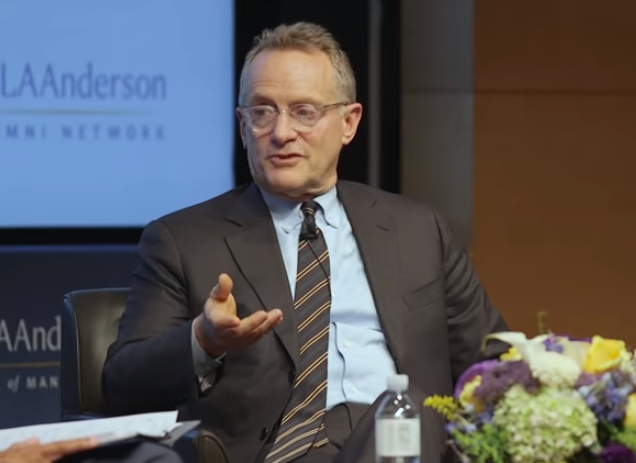Oaktree Capital’s Co-Chairman Howard Marks doesn’t like the stock market outlook right now, and the well-respected Wall Street investor thinks it’s a bad time to be heavily invested.
Marks appeared on Bloomberg TV on Monday, and when faced with the question from host Eric Schatzker of whether it was “probabilistically” (say that three times fast) a “good time to be in the market,” Marks said that “It’s not.”
“The market’s been up for 11 years, it’s quadrupled off the low, we’re in the longest bull market, the longest expansion in history, profits are not rising, stock prices are, it’s what we call a liquidity-driven rally, it comes from people having a lot of money to spend,” Marks said.
Marks argues that all those factors doesn’t mean the market is going to go down tomorrow, but “the odds are not, in my opinion, in the investor’s favor.”
“This is a time to have less risk than you did 3 or 5 years ago,” Marks continued.
When looking at the market as a whole, Marks referred to his latest memo “You Bet,” in which he likens investing to gambling and the three factors that inform the outcome, per his memo on Oaktree Capital:
In my view, the active investing I’m interested in — hopefully in markets that are less efficient — involves all three of the ingredients under discussion: hidden information, luck and skill. Thus it’s most like poker and blackjack, not chess.
The difference between luck and skill is crucial. Looking at large-cap equities, which are super-efficient, it’s more like a game of chance than informed stock-picking.
“It’s a luck game,” Marks told Bloomberg. “If you don’t have a manager who has an exceptional skill, and exceptional means rare, then you should go into an index fund, which doesn’t presuppose skill and doesn’t charge for it.”
Marks also notes in his memo that many investors are overlooking the “proposition” or in gambling, the odds. This leads to people paying too much for a stock.
Success in gambling doesn’t go to those who pick winners, but to those with the ability to identify superior propositions. The goal is to find situations where the odds are generous to one side or the other, whether favorite or underdog. In other words, a mispricing.
It’s exactly the same in investing. People often say to me, “XYZ is a great company with a bright future, so I bought the stock.” They’re picking a favorite but ignoring the proposition. The former alone isn’t enough; they should consider the latter as well.
All this led Marks to two observations on investing in his memo:
- Success in investing doesn’t come from buying good things, but from buying things well, and it’s essential to know the difference.
- It’s not a matter of what you buy, but what you pay for it.
To our friends: A former hedge fund manager exposes how Wall Street is failing American investors and shows how to prepare for the end of the bull market.
